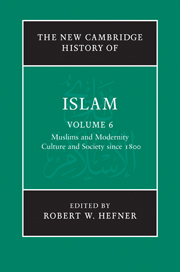Book contents
- Frontmatter
- 1 Introduction: Muslims and modernity: culture and society in an age of contest and plurality
- PART I SOCIAL TRANSFORMATIONS
- PART II RELIGION AND LAW
- PART III POLITICAL AND ECONOMIC THOUGHT
- 16 Islamic political thought
- 17 Women, family and the law: the Muslim personal status law debate in Arab states
- 18 Culture and politics in Iran since the 1979 revolution
- 19 Modern Islam and the economy
- PART IV CULTURES, ARTS AND LEARNING
- Glossary
- Bibliography
- Index
- References
19 - Modern Islam and the economy
from PART III - POLITICAL AND ECONOMIC THOUGHT
Published online by Cambridge University Press: 28 March 2011
- Frontmatter
- 1 Introduction: Muslims and modernity: culture and society in an age of contest and plurality
- PART I SOCIAL TRANSFORMATIONS
- PART II RELIGION AND LAW
- PART III POLITICAL AND ECONOMIC THOUGHT
- 16 Islamic political thought
- 17 Women, family and the law: the Muslim personal status law debate in Arab states
- 18 Culture and politics in Iran since the 1979 revolution
- 19 Modern Islam and the economy
- PART IV CULTURES, ARTS AND LEARNING
- Glossary
- Bibliography
- Index
- References
Summary
Introduction
Since the nineteenth century, when it became abundantly clear that the Islamic world had become economically underdeveloped with respect to Western Europe and its cultural offshoots on other continents, diverse thinkers have explored whether this slippage has had anything to do with Islam. One answer is that Islam has always been irrelevant to the economic development of Muslim-dominated societies. The underlying logic is that from the rise of Islam to the present Muslims circumvented Islamic prescriptions with ease. A competing answer, increasingly common in both popular and scholarly discourses, is that Islam has impaired economic development by discouraging inquisitiveness, change and adaptation. The exponents of this viewpoint invoke factors such as Islam’s alleged ban on interest and its traditionalist bias.
Yet another competing viewpoint is that the Islamic world slipped into a state of economic underdevelopment not because Islam inhibited growth but, on the contrary, because Muslims stopped abiding by its time-tested economic prescriptions. By this account, Islam has always promoted and supported economic development, and what became a problem is not its set of economic prescriptions. Rather, for selfish material gain politically powerful Muslims upset the just social order that prevailed during Islam’s canonical ‘age of felicity’, the period from 622 to 661, spanning the last decade of Prophet Muḥammad’s life and the tenure of the first four caliphs.
- Type
- Chapter
- Information
- The New Cambridge History of Islam , pp. 473 - 494Publisher: Cambridge University PressPrint publication year: 2010



